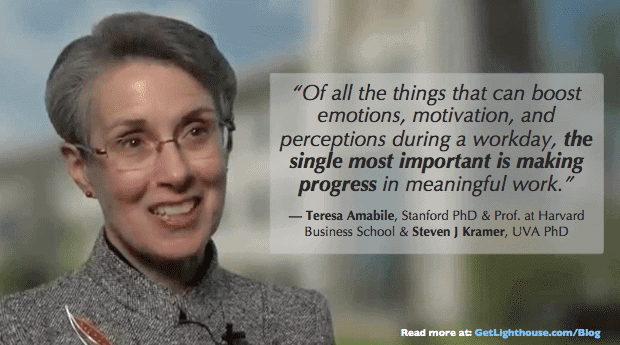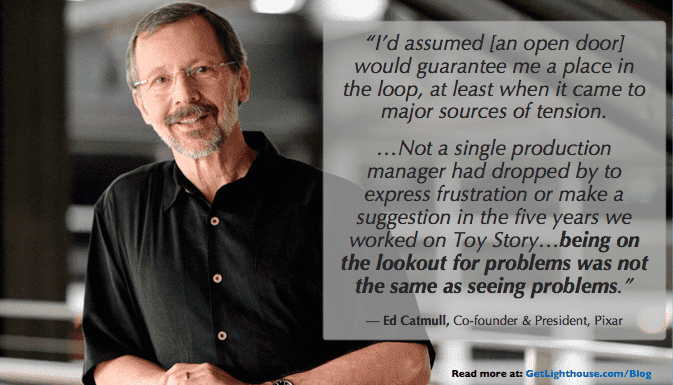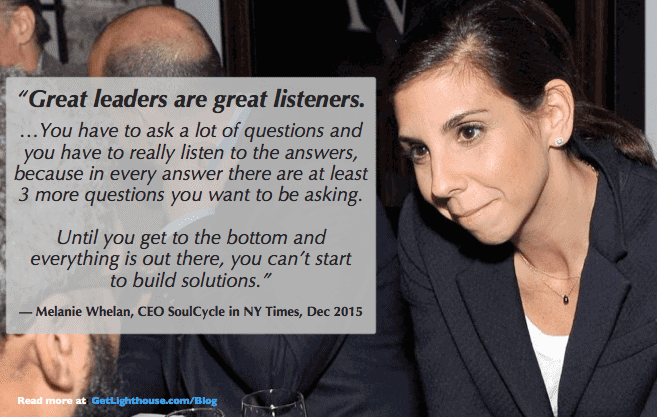"I'm giving my two weeks notice. I've taken another job."
My friend had just blindsided her manager by telling him she was leaving. The manager never saw it coming.
My friend seemed happy. She was friends with many of her coworkers, and seemed to enjoy her work. Yet, under the surface, problems were brewing.
There were a number of issues bothering her, from discovering she was under-compensated, to a feeling that she was no longer in the loop like she was when the company was smaller.
Because her manager only had check-ins with her about once a quarter, he had no idea what seemed like small or unnoticeable issues were so important to her. Their build up led my friend to search for another job, and get it, before anything was done.
Why Quarterly Check-ins Aren't Enough and Contribute to Turnover
My friend's manager was busy. He thought he didn't have time for these kinds of discussions, and so he carved out just an hour a quarter for check-ins. He figured that was enough.
As he learned the hard way, it was not.
Instead of a few hours a month out of his schedule to talk to each team member, he now had to start up a hiring process to replace her.
This would take multiple hours every day out of his schedule, and the new hire would likely cost more, since they'd have to pay market rate. This didn't even begin to count the lost productivity from her departure, nor the drain on the team having to cover her work. Turnover is costly.
Have check-ins more often than quarterly
When companies or managers think about starting one on ones, they often consider quarterly as a great way to start. This is not something you should try half way. Here's why:
1) You don't build any rapport or trust
People do not open up to strangers. If you only ever talk about work, projects, and tasks with them, then there won't be very much rapport and trust in your manager-team member relationship.
This will make the important kinds of conversations you want to have in your check-ins (like about why they may be thinking about leaving) much harder and more awkward than they have to be.
Put simply, people want to feel truly understood at work. Or as Camille Fournier, CTO of Rent the Runway puts it, they want "relatedness."And this relatedness helps in a myriad of ways as she puts it:
By taking the time to get to know them, you then have a foundation of trust that opens up healthier conversations.
However, when you only have check-ins once a quarter, there's no time to build that relationship. Without it, there's lots of room for a single quarterly meeting to never discuss the most important, underlying issues.
What to do instead: By meeting more often you can take time to build rapport as part of your check-ins. Take an interest in their passions in and out of work. Take a few minutes to ask about what you know matters to them.
When you meet monthly or more frequently, you have time to do so, and all your conversations in check-ins and your overall relationship will benefit.
2) Quarterly is often too little too late
How much can happen in 90 days? A lot. This hurts you in two ways.
First, if your check-ins are only once every 3 months, think about all the things that you could want to talk to your manager about that can happen in that time:
- Problems with a team member
- Advice on handling recurring situations
- Coaching and career development
- Things that are bothering you
- Ideas and feedback to fix or improve things
How could you ever cover all of that in a one hour meeting? How many things would you forget that you should have discussed or that became bigger problems before you could deal with them?
The second major problem is turnover. Can someone find a new job in 90 days? Absolutely. And by the time they have an offer, it's too late. You need to catch and fix problems *before* they go and get the offer.
This is why former CEO and investor Jason Lemkin writes about the importance of making time to ask your team:
If you're only having check-ins once a quarter, you're not asking often enough; you run the risk of it being too little too late.
What to do instead: Meet regularly (at least once a month), and don't be afraid to ask about what would make them take another job. Also, look for ways to help them grow, as that's a top desire of Millennials at work that often leads to them taking a job elsewhere.
3) It's too easy to procrastinate
It's possible to have healthy conversations in your quarterly check-ins. However, talk alone is not enough. You need to take action.
The problem is, even if you do set next steps, saying you need to do something by 90 days from now makes it incredibly easy to procrastinate on.
Think about it. I'm writing this in mid-April. If I told you we'll revisit something in mid-July, you're already checking out of what it is because you have plenty of time to deal with it. By July, neither of us is likely to remember it.
Regular progress is powerful.
Researchers at Stanford and Harvard discovered this in a series of research they coined as the Progress Principle:
The key to keeping morale up is to make progress on what's important to them. If your check-ins are only once a quarter, then it's very hard to make small, regular progress on those discussions.
What to do instead: Make all your check-ins recurring, regular, and actionable. By setting next steps on these topics that matter so much to them, and when they need to be done by next, you'll build accountability together. Also, by knowing a time that you'll specifically talk about results again, it raises the importance of completing them, especially when the next check-in isn't far away.
4) It shows a major imbalance between employee and employer
Most companies at least pay lip service to the phrase "our people are our most valuable asset". What are you saying to your team if you will talk about what's important to them only once every 90 days?
Let's do the math: 90 days, or 1 quarter, is 13 weeks. If someone works 40 hours a week, that's 520 hours of work per quarter. If you have check-ins only once a quarter, you're saying just 1 hour of their 520 hours of work are for discussing what matters to them. That's only 0.19% of their work time with you. (And in America the average is actually 47 hours, so it's an even greater gap in the US.)
If you want to put your people first, you have to demonstrate in your actions. Saying it is not enough.
This is a lesson that Ed Catmull, cofounder and president of Pixar, learned as he helped build Pixar into the movie powerhouse they are today. He reflected on it in his book, Creativity, Inc, when he wrote:
One of the most meaningful things you can give your team is your time. What are you saying to your team by how you spend your time?
What to do instead: Establish that these check-ins are for them and commit to making the most of them. Look for ways to delegate a few more tasks or get enough things off your plate that you can make this commitment.
Remember: Your job as manager is to be a multiplier, and the kinds of things you do in check-ins are multiplier activities as you help the whole team work better and happier.
5) There's not enough time to cover everything
When you have an hour to cover everything that's on the mind of a team member for the last 90 days, plus what you want to ask them, time is not on your side. Too much happens to talk about it all in 1 hour.
Another issue is memory; it's too easy to forget important things that happened months ago that would have been healthy, developmental discussions.
This issue then compounds when the team member feels that there isn't time to talk about everything they want to. As Andy Grove, the late, great founder and CEO of Intel, wrote in his leadership classic, High Output Management:
When you meet this rarely, it's unlikely you're going to cover everything you need to. When you only have check-ins once a quarter, the team member has to be very picky with how they want to spend their hour with you. They also have to be bold enough to bring up zingers quickly, which is difficult without the rapport that comes with regular such discussions.
What to do instead: Make time to meet for often. There's a reason companies like Adobe, GE, and Deloitte have biweekly check-ins. Consider their Task Relevant Maturity and meet more often with those struggling or new to a role. To make the most of the time, bring questions, too. It's a key skill to draw things out, especially for your introverts.
But...What about my open door policy in between?
Open door policies do not work for a variety of reasons. As Ed Catmull, cofounder of Pixar, learned, expecting people to come to you is unlikely to actually happen as you imagine it will:
But...I don't have time?
If you don't have time for regular check-ins, do you have time to replace them? Unfortunately, it's often that multiple employees quit at the same time, and it's much more costly to replace someone than it is to spend a few hours a month talking about what matters most to them.
Even better, your time spent in check-ins can have a huge return on investment, as Andy Grove, former CEO of Intel, reflected on the power of biweekly one on ones:
But...What if my team doesn't seem to have anything to say?
Especially when you start out, everyone on your team will not be rushing to tell you everything that they want your help with. That's why we mentioned the importance of rapport earlier. Over time, and with proof that things get better after talking to you, people will open up more.
In the meantime, the best thing you can do is bring good questions. This will draw out answers, whether you're still earning their trust or you're working with an introvert. As SoulCycle CEO, Melanie Whelan, reflected:
So what should I do?
Try to have check-ins with everyone on your team every 1 to 4 weeks depending on their Task Relevant Maturity, and how they're doing.
Someone struggling, or that you're trying to improve the performance of, should have weekly check-ins to ensure regular progress. For those comfortable in their role, you can reduce your frequency of check-ins, until you give them new responsibility, or if you find your check-ins never have enough time for everything.
Based on best practices like the ones you read today, it can help you have great check-ins from the first meeting to improve morale, motivation, and retention.
Further reading
- Leading Happy Teams: 5 Ways to Keep Your Team Happy in a Recession
- How to Help Your Team Avoid Employee Burnout during COVID
- 13 Reasons Why Great Employees Quit
- How to Turn Around an Underperforming Employee
- Why People Leave Managers Not Companies (And 5 Things You Can Do About It)
- 5 Ways Founders Wreck Their Company Culture (and How to Create a Great Company Culture Instead)













